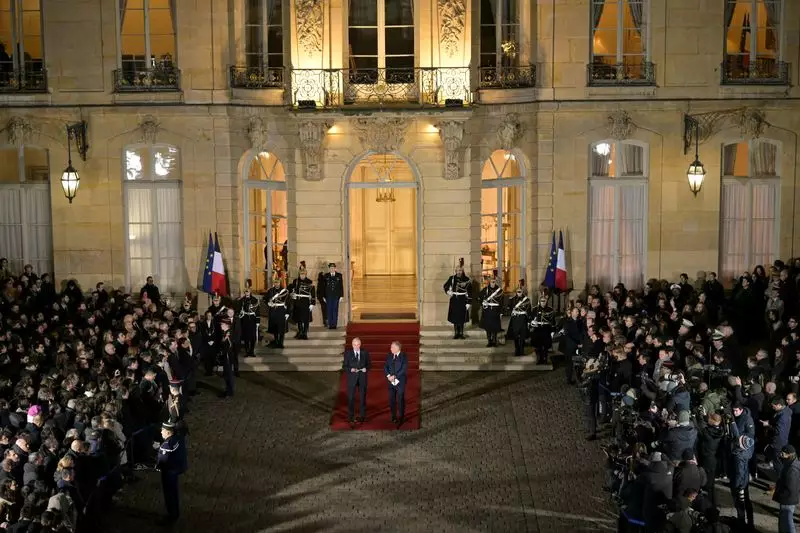France has recently ushered in François Bayrou as its new Prime Minister, marking a pivotal moment in a shifting political landscape characterized by fragmentation and discord. As the fourth prime minister appointed under President Emmanuel Macron’s administration in a single year, Bayrou inherits a tumultuous parliament and the daunting task of crafting a budget for 2025. This new chapter is far removed from his previous tenure as Education Minister in the 1990s, where his attempt to expand private school funding provoked fierce public backlash. The atmosphere today is electric, charged with the undercurrents of political strife that threaten to disrupt his governance from the outset.
Bayrou’s initial hurdle will be assembling a governing body that can effectively navigate a parliament replete with ideological divisions. Previous Prime Minister Michel Barnier’s ouster marked a significant event; for the first time since 1962, a parliamentary vote led to the removal of a government. This shakeup left lasting reverberations, hinting at the difficulties Bayrou will encounter in securing stable support for his initiatives. In the present landscape, political cohesion is a luxury that may be unattainable, with far-right and leftist factions poised to challenge any policies that do not align with their agendas.
In this context, Macron’s choice of Bayrou was framed as an attempt to foster consensus amidst tumult. However, critics, particularly from the Socialist camp, decried him as a symbol of continuity rather than change. Such sentiments underline the skepticism any new prime minister will likely face in trying to bring diverse ideological groups together for a common purpose, particularly when urgent fiscal legislation must be enacted swiftly to secure governmental funding.
Arriving in office with a pressing financial imperative, Bayrou has echoed warnings about France’s debt crisis, describing it not merely as a fiscal concern but as a “moral problem.” This perspective creates an added layer of complexity as he seeks to balance financial austerity and the socioeconomic stability of his constituents. The urgency of passing a budget is overshadowed by looming realities: the projected budget deficit for 2024 is already at a staggering 6.1%. A growing expectation exists that Bayrou will have to navigate budget cuts while managing the expectations of trade unions and other vested groups.
Historically, Bayrou has been a centrist figure, emphasizing dialogue and compromise. However, the starkly polarized environment in the National Assembly presents a formidable barrier. Lawmakers recently opposed budgetary proposals that Barnier backed, leading to his government’s downfall. Should Bayrou attempt to pursue a similarly contentious path, he risks inciting further dissent among lawmakers who might leverage constitutional mechanisms to resist his budget proposals.
The persistent influence of the far-right continues to loom large over French politics, particularly with the National Rally’s focus on fiscal policies that guard the interests of its voter base. Jordan Bardella, the party leader, has been vocal about maintaining “red lines” regarding the budget, particularly concerning pension adjustments. Bardella’s alignment with Marine Le Pen indicates the far-right’s growing traction in the face of economic challenges, with recent opinion polls suggesting significant support for Le Pen approaching the next presidential election in 2027.
This political momentum poses a complex predicament for Bayrou. Will he engage with far-right demands at the potential expense of alienating more moderate factions? Or will he adopt a stringent approach that risks exacerbating an already fractious political climate? Such decisions will not only shape his administration’s policies but also dictate the public’s trust in his leadership.
As Bayrou steps into his role, he bears the weight of significant challenges that transcend simple legislative maneuvering. The economic landscape is fraught with threats: inflation, rising military expenditures necessitated by geopolitical tensions, and the urgent need to revitalize a struggling industrial sector. Bayrou’s legacy will hinge on his ability to address these multifaceted issues while simultaneously maintaining governmental continuity and negotiating complex political dynamics.
The appointment of François Bayrou as Prime Minister signals a critical juncture for France. With an entrenched parliamentary landscape, soaring national debt, and rising far-right influence, the path he treads will be anything but straightforward. If he is to succeed, Bayrou must deftly maneuver through the political minefield, finding opportunities for cooperation while responding to the urgent needs of a nation teetering on the edge of stability.

